Cloud computing has transformed business globally with highly efficient, affordable, and elastic solutions. Cloud technology continues at the top now that the year 2025 has arrived with it empowering enterprises to improve security, automate costs of operation, and create competitive advantage in a more digital society.
From hybrid and multi-cloud approaches to AI-based automation and edge computing, cloud services are transforming rapidly, offering companies increased agility and resiliency. Global spending on public cloud by the world’s spend is expected to grow to $679 billion by 2024, a 20.4% increase from 2023, says Gartner, citing its increasing dominance (Gartner, 2023). Companies are leveraging these technologies to automate operations, increase digital cloud security, and drive sustainable growth.
This blog speaks about the top 10 cloud-based enterprise solution, strategic benefits it has to provide, and answers key questions related to cloud adoption. Whether a startup company is looking to expand or an enterprise is searching for ways to streamline IT infrastructure, awareness about cloud technology is the key to future success. Be ahead of the curve and implement the next generation of cloud innovation.
Why Businesses Require Cloud Infrastructure?
Before implementing best cloud-based enterprise solution , it is essential to know what “cloud” stands for. Cloud is a technology that points towards online servers, which facilitate the usage of software and databases on this platform.
Cloud servers are made available in data centers globally, lowering the requirement for the company to keep physical servers and allowing an online server to execute software applications.
The cloud environment lowers companies’ expenditure on a large scale, lowering the costs of keeping hardware capacities to execute software programs with massive processing power. Cloud service migration is a blessing for small as well as big-sized companies and is advantageous to businesses in various aspects.
Advantages of Cloud Computing
Increased Scalability And Flexibility
These web-based services scale your businesses’ resource consumption by offering access to a centralized software and database platform, where all business employees can work together and share resources & data.
Enhanced Data Security & Recovery
Enterprise data breaches are common today and can penetrate enterprises from any direction, such as lost laptops and exposed passwords. These breaches can lead to the loss of billion-dollar data and become a major revenue decline. Implementing robust cloud security measures ensures that sensitive data stored and processed in cloud environments is protected against unauthorized access and potential breaches.
Mobility Access
Cloud computing makes it possible for businesspeople to access company information from intelligent devices such as cell phones, palmtops, and tabs. It merely indicates that companies can enable their employees and team members to access disparate organization information like sales figures, daily attendance systems, etc.
Improved Employee Collaboration
No matter how many employees your business has or where they work, the cloud helps you realize the highest quality collaboration. The cloud provides the ability for many people to collaborate in a shared environment, which allows employees to connect.
Greater Accessibility
It is easier to use cloud-based software rather than hardware-based software. Additionally, such software facilitates employees to use the company data anywhere, and they can work on the data continuously even though they are out of place. That implies employees no longer have to remain at their desks. Companies can also implement cloud cost optimization strategies to monitor and manage their cloud spending effectively, ensuring resources are used efficiently.
Competitive Edge
Cloud computing service provider firms are increasing their dominance; the popularity of this trend is also increasing immensely.
Firms that use the cloud can enjoy with special benefits and vast insight into their organizations’ growth. 77% of firms reported that the cloud provides them with competitive advantages.
Improved Quality Control
Quality control is also an important element in using cloud services. Businesses that utilize cloud systems can benefit from the advantage of keeping everything in a single location. In addition, single-formatted data provides unorthodox convenience; since the same information is accessed by everybody, businesses are able to have consistent data and prevent human mistakes. In addition, data management is simple in silos of clouds, and all saves of files in one location; no issues such as data confusion and dilution happen.
List of Top 10 Cloud-Based Enterprise Solution
1. Amazon Web Services (AWS)
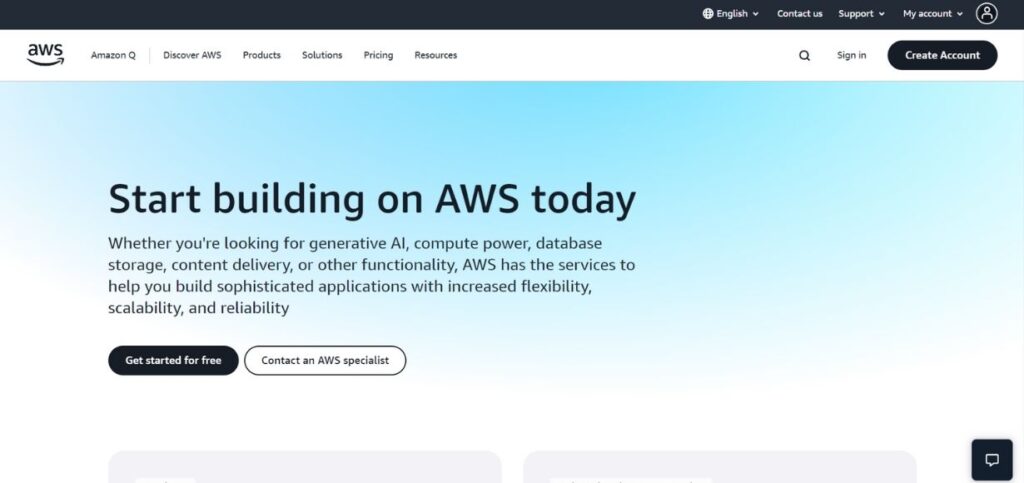
The AWS was launched in 2006 and is the world’s top cloud service provider dominating the market. It becomes a key player in AI, database, machine learning, 5G cloud, multi-cloud, and serverless deployments. AWS is currently operating in 20 geographical regions worldwide. The company announced a revenue of 9 billion dollars for Q3 2019. AWS provides 175 fully-featured services to address any type of business needs. These include database storage, computer power, networking and many more
You can host any applications virtually, such as networks like Load balancing, firewall, DNS, or even you may have your virtual private cloud. Simple sign-up and quick deployment. The most wonderful thing is that there is no initial cost and you only pay for what you consume. It also has a FREE option for some of their most used services.
Features:
- Scalability – Auto-scaling and load balancing
- Wide Service Offerings – 200+ services (EC2, S3, AI, ML)
- Global Infrastructure – 100+ availability zones
- Security & Compliance – IAM, encryption, GDPR, HIPAA compliance
- Flexible Pricing – Pay-as-you-go, reserved instances, and spot pricing
2. Microsoft Azure
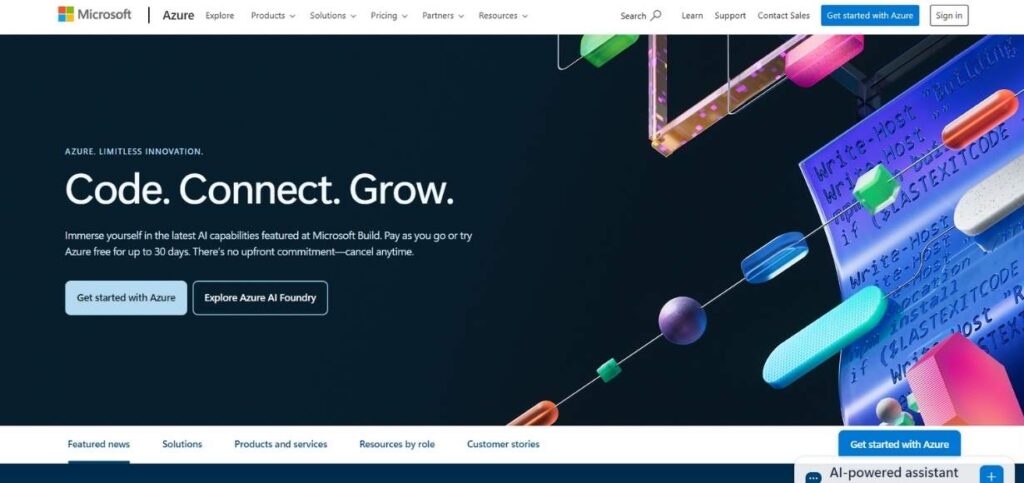
Microsoft Azure was initially launched in 2010 as Windows Azure, and later it was renamed, Microsoft Azure, in 2014. It was introduced years later than the introduction of AWS and Google cloud but still, it is the fastest-growing cloud and competing fiercely with AWS and other cloud providers. Microsoft has a five-year partnership with Disney. In this collaboration, the new process will be established to shift manufacturing content to the cloud. Azure has 54 data centers locations globally available in 140 countries.
Features:
- Scalability – Auto-scaling and load balancing
- Hybrid Cloud Support – Seamless integration with on-premise infrastructure
- AI & Machine Learning – Azure AI and Cognitive Services
- Security & Compliance – Advanced threat protection, IAM, GDPR, HIPAA compliance
- Global Infrastructure – 60+ regions with multiple availability zones
- Developer Tools – Integration with GitHub, Visual Studio, and DevOps tools
- Flexible Pricing – Pay-as-you-go and reserved instance models
3. Kamatera
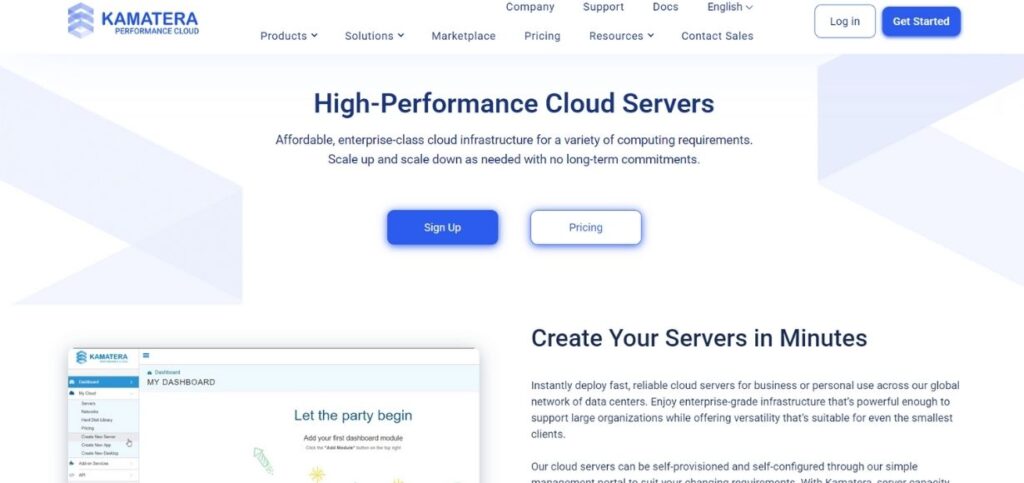
Kamatera, launched more than twenty years ago, has become a leading and robust cloud infrastructure platform in the sector. With robust scalability at the core, Kamatera provides companies with an ability to custom-configure cloud environments according to real-time demands, making it a favorite for startups and huge corporations alike.
As compared to all other vendors, Kamatera is very cost-efficient in its price, and the customers only pay for the consumed resources without paying extra. The solution supports a wide variety of operating systems and software, giving customers complete flexibility to design and host custom cloud solutions. In 2024, Kamatera is renowned for its global data centers offering low latency and high availability worldwide.
Features
- Global Data Centers: 18+ data centers for low-latency performance worldwide
- Pay-as-You-Go Pricing: Paid per second, no long-term commitments
- High Performance: up to 40 Gbit/s network, Intel Xeon CPUs, and SSD storage
- Complete control or completely managed cloud services are offered as managed and unmanaged solutions.
- Security & Compliance: DDoS protection, backups, and firewalls
- Easy Deployment: Deploy a server in just a few minutes.
4. Alibaba Cloud
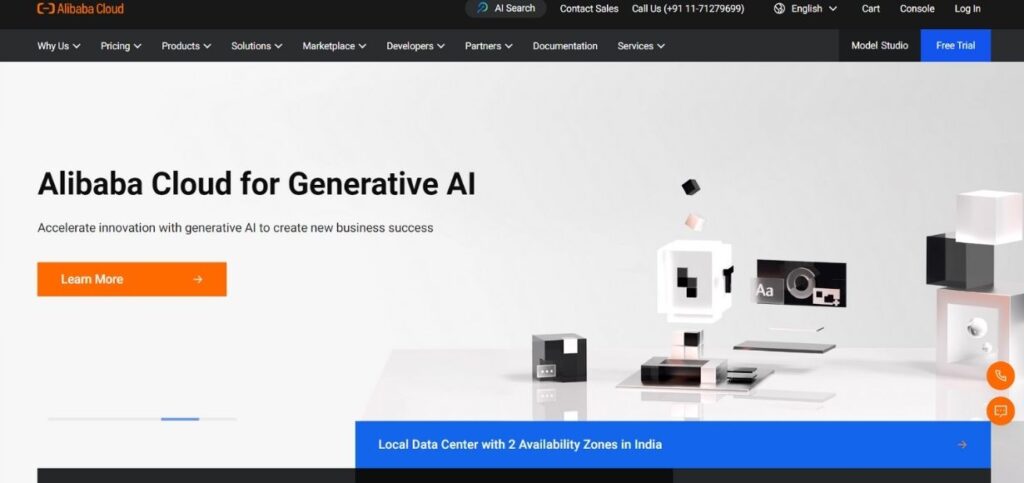
Alibaba Cloud, or Aliyun, is a cloud computing company and a subsidiary of Alibaba Group and one of the largest Chinese technology and e-commerce conglomerates in the world. It offers a full suite of cloud-based enterprise solution products to support businesses all over the world, including Market Presence, Currently holding the third largest market share worldwide in cloud computing, after Amazon Web Services (AWS) and Microsoft Azure.
Features
- encompass big data solutions for analytics and machine learning, horizontally scalable cloud computing with Elastic Compute Service (ECS), and artificial intelligence.
- Security and compliance with encryption and DDoS protection
- 30+ data centers distributed across a number of regions comprise this global network.
- Support for on-premises and multi-cloud combination through hybrid cloud
- reasonably priced IoT and blockchain offerings for sophisticated applications vs. AWS and Azure
5. Oracle Cloud
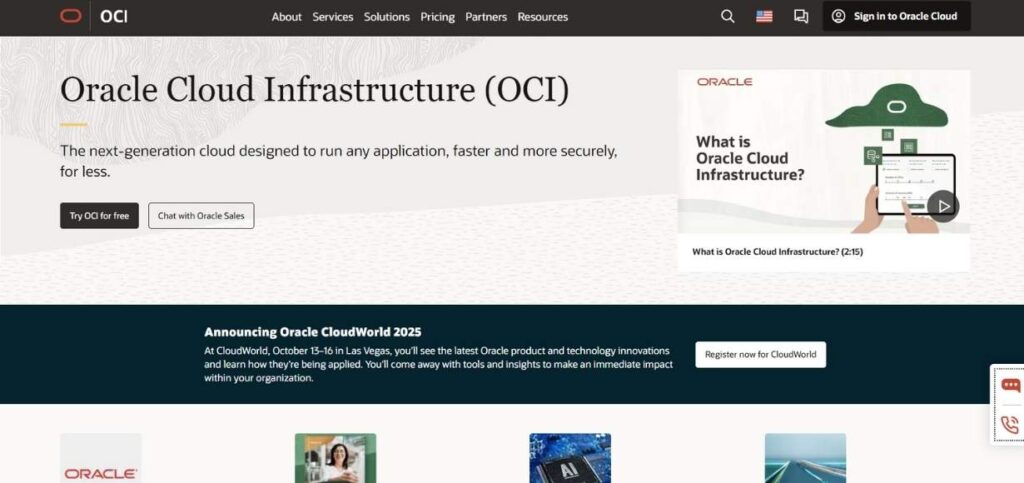
Oracle Cloud is a cloud service, based on ERP(Enterprise Resource Planning), through which you are assisted in constructing, deploying, and managing the workload in the cloud or locally. Oracle boasts of having roughly 4, 30, 000 colossal amounts of customers worldwide. Total revenues generated by Oracle were close to 6.81 billion dollars in the year 2019.
Features
- Oracle IaaS products are Compute, Storage, Networking, Governance, Database, Load Balancing, DNS Monitoring, Ravello, and FastConnect.IaaS assist in executing any type of workload of an Enterprise.
- Oracle PaaS products are Data Management, Application Development, Integration, Business Analytics, Security, Management, and Content and Enterprise. PaaS assists developers in developing, connecting, securing and sharing data between the applications.
- Oracle SaaS solutions include CX, HCM, ERP, SCM, EPM, IoT, Analytics, Data, and Blockchain Applications. SaaS offers an end-to-end data-driven and secure cloud ecosystem.
- The greatest advantage of this cloud services company is its chatbot feature which can assist clients 24/7 whenever they encounter challenges.
- Users’ data analytics that assist decision-makers to plan for the financial situation of the company.
- Secure and enhanced visibility to unsanctioned apps and safeguard against advanced cyberattacks.
- Payment based on the usage.
Suggested Blog: Best Cloud-Based Accounting Software
6. IBM Cloud
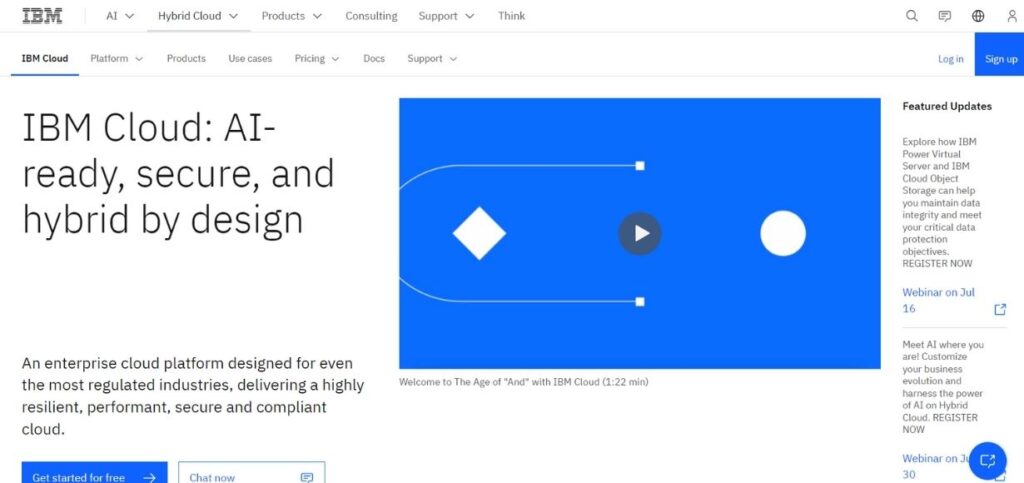
IBM developed this cloud service that provides another range of solutions to the users to host their applications on the cloud. It provides IaaS, SaaS, and PaaS services through public, private, hybrid and multi-cloud models. IBM has earned 5.3 billion dollars of revenues as per Q3 2019 which is 6.4 percent more than the last quarter. IBM cloud provides around 170 products and services to fulfill the business requirements of the customer. IBM’s top bets are in the guise of the Internet of Things, Cognitive Computing and Blockchain. IBM has of late acquired Red Hat, for delivering hybrid solutions effectively. IBM cloud service is assisting home appliances makers, retailers, and health supply companies.
Features
- Computer Network, Storage, Cloud Packs, Management, Security, Database, Analytics, AI, IoT, Mobile, Dev Tools, Blockchain, Integration, Migration, Private Cloud, and VMware are some of the services provided by IBM cloud.
- Freedom to choose and combine the preferred tools, data models and delivery models in creating/designing the next-generation applications or services.
- Users are able to control their applications in numerous coding languages like Java, Python, Swift, Php, etc.
- IBM AI assists with its multi-functional capability like text to speech, language detection, machine learning, natural language classification, etc.
- Cost is usage-dependent but free in lite mode with access to over 40 services for free by IBM Cloud.
- You can integrate highly performing cloud communications and services into your IT infrastructure through IBM Bluemix Cloud platform.
7. BizAutomation
Seventh on the list is a Cloud-Based Enterprise Solution that is business-friendly for small businesses and has a high level of satisfied customers. BizAutomation is a comprehensive suite of business management applications for varied industries such as wholesale, distribution, manufacturing, retail and service.
The system boasts a hybrid-cloud strategy that includes a tier 1 SOC private solution cloud, an AICPA compliant data center and a public cloud for data redundancy. By connecting with dbt cloud, BizAutomation users can enhance their data transformation capabilities, enabling smoother analytics integration and more accurate business intelligence across their cloud systems.
Features
- Mass Orders: Manage many customer orders from one point of entry.
- Multi-currency: Have multi-currency for profits and losses and exchange currencies to your pre-selected home currency.
- Time and Cost Management: Apply detailed timesheets and enter costs, establish request for approval and combine data with project management and payroll cost capabilities.
- Bills of Material (BOM) Resource Planning: Run back-ordered BOM analyses to control re-order BOMs and work orders based on long-term demand and rebuild points.
- Workflow Automation: Add a workflow engine for overall automation and apply workflow rules and automation to all company departments.
8. SAP S/4HANA
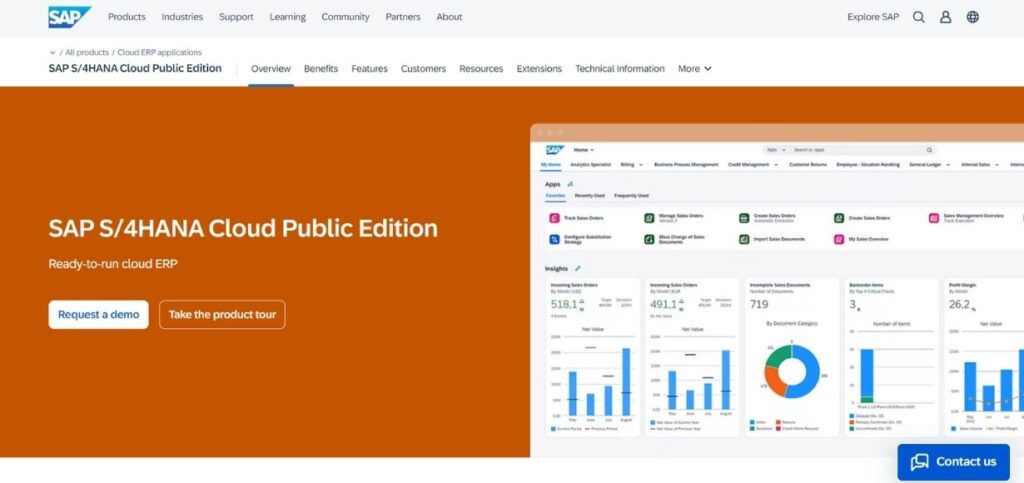
It was a decade ago when SAP launched the concept of the SAP HANA in-memory database and were met with high skepticism and doubt. The naysayers were, however, proved wrong with solutions like SAP S/4HANA, a well-known ERP system running on that same SAPHANA in-memory database.
SAP has always been committed to taking advantage of the latest technology, and it is evident with SAP S/4HANA, which has embedded analytics, artificial intelligence (AI), machine learning and robotic process automation (RPA). SAP S/4HANA provides a software developer kit which allows custom applications, extensions and vertical solutions to be created.
It also includes the SAP Fiori user experience (UX), which provides users with user-friendly applications accessible from any terminal and allows developers to create applications based on the Fiori framework. This platform is a power pack with smart recommendations, strong control over customizations, world-class UX and much more.
Features
- Free Trial: Use a 14-day free trial and test the Fiori user experience, role-based guided tours, features and workflows.
- Real-estate Administration: Enhance occupancy and cost levels with space utilization by overseeing investments, construction projects and lease contracts. You may also conduct infrastructure renovations, restorations and inspections.
- Inventory Material Monitoring: Solve problems by defining net requirements, individual customers and direct procurement segments for every material.
- Machine Learning: Set buffer levels on forecasted lead time of stock transfer materials to control inventory and limit capital. You can also reduce production or delivery risk by forecasting transit stock delays.
- Sales Performance Management: Manage sales performance and create and maintain strategically-aligned plans for executing incentive and commission management.
9. Netsuite
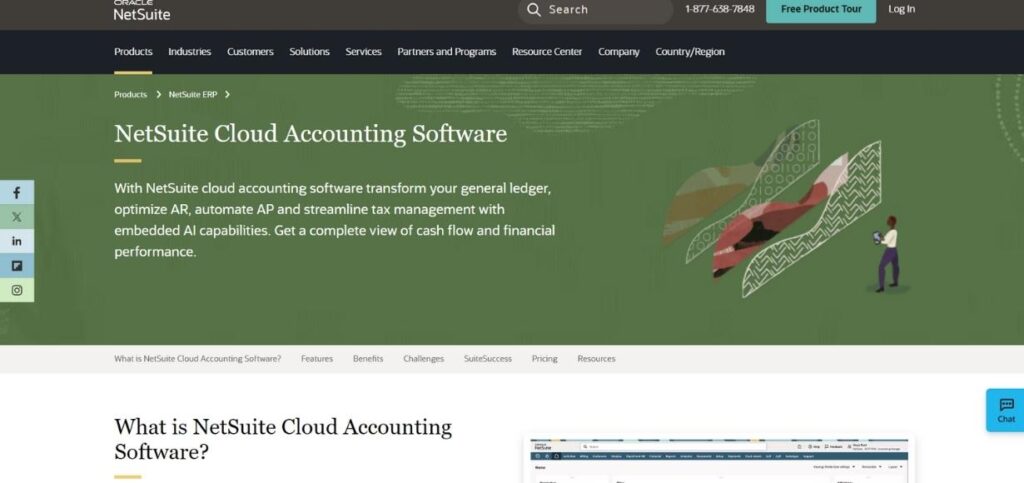
This system is suitable for a company that seeks an end-to-end Cloud-Based Enterprise Solutions but isn’t certain about the higher functionality in tier one systems, i.e., Oracle ERP Cloud or SAP S/4 HANA. Netsuite serves around 20 industries like advertising, consulting, education, energy, financial services, FMCG, healthcare, hospitality, IT services, manufacturing, retail, logistics, wholesale distribution, etc.
Customers have commented on the product as being simple to use and convenient for the staff of the entire organization. This solution manages numerous business functions including sales orders, inventory management, invoices, sales reports, purchase orders and much more.
Features
- Embedded BI: Control embedded BI tools that combine data with visual analytics to develop useful business awareness.
- Customization: Customize NetSuite to suit your different practices or create brand-new applications with workflow management, scripting, analytics, web services and more.
- Strategic Workforce Planning: Streamline workforce planning and associated costs, such as headcounts, pay and compensation programs. Implement this streamlining by linking the organization’s priorities and needs with its objectives.
- Dynamic Modeling: Used modeling, analytics, and integration in Excel to highlight company data.
- Shipping: Ship products quickly from the closest location to fulfill clients’ specific delivery requirements.
Conclusion
By the year 2026, the Top 10 Cloud-Based Enterprise Solutions boast a vast range of solutions from industry leaders like AWS, Microsoft Azure, and Google Cloud to new players like Oracle Cloud and IBM Cloud. These vendors cater to various business needs with offerings covering from compute, storage, AI, and more. With reliability and innovation at its core, the companies can leverage these platforms for agility, scalability, and digital transformation.
Having diversified their offerings and services to vertical industries where they have gained a foothold, cloud ERP software vendors are now examining how to sell more to enterprises. Two-tier ERP selling strategies are now standard, where cloud ERP vendors introduce themselves as a localized ERP instance connected to the legacy ERP system.
The leaders in cloud ERP solutions continuously upgrade their analytics, BI, mobility and quality management systems. Keep this in mind while searching for your cloud ERP system.

